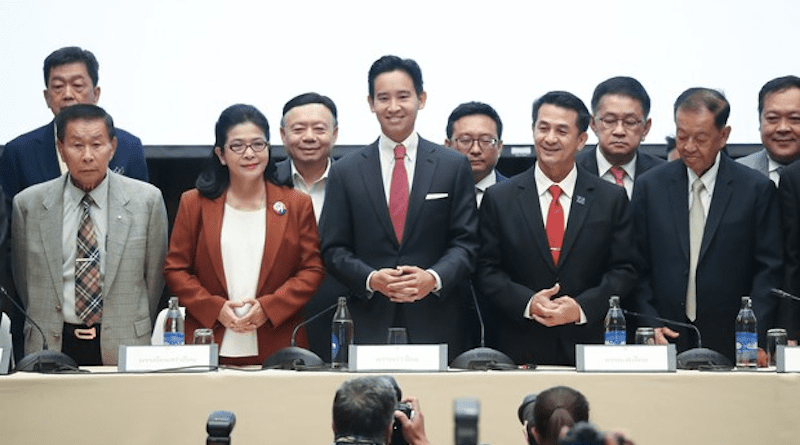Thailand: Opposition Has ‘Roadmap’ To Govern, But Royal Reform Issues Linger
By BenarNews
By Wilawan Watcharasakwej
The leader of Thailand’s top vote-getting party said Thursday that a coalition government was “firmly taking shape,” although it appears that his proposed reform to the nation’s royal defamation law could prove a sticking point in negotiations.
Move Forward Party chief Pita Limjaroenrat announced an alliance of eight parties holding 313 of the 500 seats in Parliament’s lower house. These include two new partners that are smaller parties, Palung Sungkom Mai and Pheu Thai Rumapalang (no relation to the Pheu Thai Party).
“There is momentum, there is progress and we also have a very clear roadmap from today until the day I become prime minister,” Pita said while sitting with coalition partners at a press conference in Bangkok.
“That includes a couple of working teams to sort out any differences, as well as to make sure there is continuation of power, minimizing risk, as well as reducing destabilizing factors that might damage the country, economy or financial markets.”
Though the coalition has added two more parties and three seats, it is short of the 376 required to govern in the 750-seat bicameral legislature.
Voting rules enshrined in a constitution drafted by the military in 2017 mean the alliance has to overcome 250 votes held by the junta-appointed Senate, Parliament’s upper house.
Move Forward’s ambition to amend the Lèse-Majesté law, which human rights groups allege the current government has used to silence dissent, is shaping up as one of its biggest hurdles to forming a government. The law carries jail terms of up to 15 years for actions or speech deemed as insulting, defamatory or threatening to the monarchy.
It is unclear how the senators in the upper house will vote. While a few have expressed support for a majority government, many pro-royalist senators are likely to find Pita’s campaign proposals too radical.
“What sticks in my mind is the amendment to or the abolishment of Article 112,” Sen. Chadej Insawang said, referring to the section of the criminal code concerning royal defamation or Lèse-Majesté.
Changing the law would affect Section 6 of the Thai Constitution, which enshrines the monarchy as head of state, he said.
In a statement on Wednesday, the Bhumjaithai party, which won 70 seats in Parliament, said it would not support a prime minister who seeks to amend Article 112 of the criminal code.
Even within the new alliance there appears to be ideological differences on the extent of Lèse-Majesté reform.
Before a memorandum of understanding could be signed, “all aspects” would be considered, said Cholnan Srikaew, leader of the second largest opposition party, Pheu Thai.
“All parties will jointly consider the MoU and see what each of us can accept and what has to be changed. Article 112 is part of it,” Cholnan said at the news conference. “If we sign the MoU, that means we have reached a final conclusion on Lèse-Majesté law.”
Pheu Thai, the populist vehicle of the Shinawatra dynasty, previously said it does not support wholesale reform of the anti-royal defamation law, only its discussion in Parliament.
Another coalition leader, Sudarat Keyuraphan, from Thai Sang Thai, said it was a “duty to conserve the monarchy,” but added that 112 should not be misused.
“We need to solve the problem to ensure Article 112 will not be used as a tool to hurt people who think differently,” Sudarat said. “We need to talk about this article and other issues.”
The coalition MoU will be declared to the public on Monday, leaving the parties several days to hash out final details of the agreement.
Potential pitfalls
Thannapat Jarernpanit, a professor at Pibulsongkram Rajabhat University, said Pita faces potential pitfalls as he seeks to run the nation’s government.
“Though the coalition becomes clear with eight parties, the support for the prime minister from the senators seems to be uncertain,” Thannapat told BenarNews.
“There are senators who would protect the monarchy rather than abiding with the democratic principle. The Move Forward Party has to work hard to explain its approach on the Lèse-Majesté law to the senators,” she said.
In addition, the legal process could block Pita’s path.
Before the election, activist Ruangkrai Leekitwattana filed a complaint with the election commission challenging Pita’s qualification for office over ownership of shares in a media company. Ruangkrai has claimed that Pita holds 42,000 shares in media company ITV Plc, noting that owners and shareholders of media companies are prohibited from running in national elections.
A similar complaint that followed the 2019 general election resulted in Future Forward Party leader Thanathorn Juangroongruangkit losing his seat in parliament over his ownership of shares in the V-Luck Media Co. Ltd.
The court later disbanded Future Forward over a loan Thanathorn made to the party, leading Pita and other members to establish Move Forward ahead of this year’s election.
Meanwhile, it could be weeks or months until the next prime minister’s identity is known, as the nation’s electoral system allows up to 60 days for the release of official results and parliament convenes two weeks later to vote for the nation’s leader.
While the opposition has been given a strong mandate to govern, a minority government formed by pro-military parties, which were trounced in Sunday’s vote, is possible if the 250 senators vote in a bloc.
Kunnawut Boonreak contributed to this report from Chiang Mai, Thailand.

